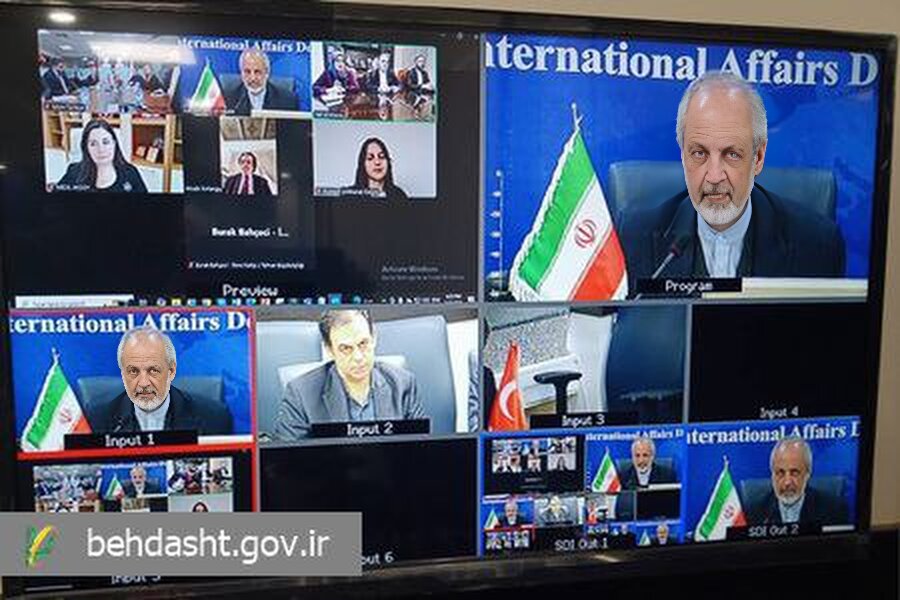Tehran, Ankara hold joint health committee meeting

TEHRAN – The health ministries of Iran and Turkey held an online meeting for cooperation on Thursday with the presence of Mohammad-Hossein Niknam, the Iranian deputy health minister for international affairs, and Aziz Alper Biten, the Turkish health ministry’s director general for the European Union and Foreign Affairs.
Mohammad-Hassan Habibllahzadeh, the Iranian Ambassador to Ankara, and Hicabi Kirlangic, the Turkish ambassador to Tehran also attended the meeting.
Highlighting the remarkable capabilities of the two countries’ health systems, Niknam stressed the importance of promoting cooperation between the two systems to meet bilateral as well as regional needs.
The official went on to propose expanding collaborative partnerships in medicine, medical equipment, and medical studies focusing on improving interactions between universities of medical sciences, conducting health research, providing specialized treatment services to patients, making joint investments and developing health infrastructure, dealing with communicable and non-communicable diseases and diseases.
Referring to the signed memorandum of understanding (MOU) between the two countries on health in 2018, Niknam proposed developing an action plan based on the same MOU and sharing it with the Turkish health ministry.
Aziz, for his part, said, the ministry of health of Turkey welcomes Iran’s proposal, and expressed hope that by implementing the action plan, the two countries further develop ties in various health sectors.
In 2018, Iran and Turkey signed an MOU to expand bilateral cooperation in the area of health and medical care. The MOU was signed by the then Iranian Foreign Minister Mohammad-Javad Zarif and his Turkish counterpart Mevlüt Çavusoglu.
The agreements were made over the trip of an Iranian high-ranking delegation to Turkey to attend the 5th Session of the High Council of Iran-Turkey Strategic Relations.
Earlier that year, Iran’s Salamat health insurance organization and Turkey’s Medofas Medical also signed an MOU to collaborate on developing their healthcare systems through the use of information technology and electronic infrastructures.
Iran’s health sector a role model in the region
In January, President Masoud Pezeshkian called the country’s health system a role model in the region and even the world thanks to its unique, particularly primary healthcare, services.
In a letter addressing a national seminar held in Mashhad to honor healthcare staff including nursing aids, Pezeshkian lauded the substantial progress made in the health sector, the health ministry’s website reported.
The president said these remarkable achievements are the results of health workers’ ceaseless efforts, such as providing vaccination and prenatal care for pregnant mothers, controlling infectious diseases, promoting health education, sharing knowledge, and training new generations of health staff nationwide.
The notable increase in life expectancy, reduction in infant mortality rate, control of infectious diseases, and reduction in complications from chronic diseases are all due to health workers’ dedication and commitment.
Also, in October 2024, the World Health Organization’s (WHO) director for the Eastern Mediterranean Regional Office (EMRO) called Iran’s health sector a role model in the region.
WHO EMRO is interested in expanding cooperation with the Islamic Republic of Iran, IRNA quoted Hanna Hasan Balkhi as saying.
The official made the remarks in a meeting with Alireza Raeisi, the Iranian deputy health minister, and Mohammad-Hossein Niknam, the deputy health minister for international affairs, on the sidelines of the Seventy-first session of the WHO EMRO, which was held in Doha, Qatar, from October 14 to 17, 2024.
“During my short visit to Iran a few months ago, I became familiar with the capabilities of Iran in the health sector; Iran is a role model in health in the region,” Balkhi noted.
“Utilizing full potentials available in the [regional] countries is essential for us, and we will not hesitate to support the implementation of health programs,” the official noted.
MT/MG
Leave a Comment